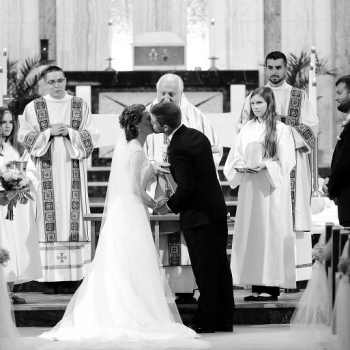I posted a video on my Facebook page earlier this week in which I argued that pornography contributes to the sexual violence that’s so rampant in our culture today, and was met with significant resistance from a handful of the men who follow me.
Their reaction reminded me of a conversation I had with a friend just over a year ago. He’d told me, laughing, that Barstool Sports had announced they’d hired a former porn star for a spot on their most popular podcast. When I didn’t laugh in response, he became defensive. “Porn isn’t really something that falls within my sense of humor,” I told him.
“Yeah, you and every other girl on the planet.”
Well, yeah, no kidding. Porn just isn’t something that appeals to the average woman, necessarily. Not to say that there aren’t women who watch porn, and definitely not to say there aren’t women who suffer from porn addictions—nevertheless, it tends to be a man’s interest (as men are visually stimulated and have a higher sex drive). And in today’s world, where it’s so easily accessed and considered such a commonplace consumption, men have very few reasons not to watch it.
I can recall another time that I was out with friends on a Friday night, when we wandered into a local tavern in a quiet neighborhood in Chicago. We approached the bar, looked up at the numerous televisions hung across the wall, and were shocked by what we saw: hardcore porn. It was apparently “chicken & porn” night at our nearby watering hole.
Porn isn’t something people sneak a peek at in the dark quiet of their own homes anymore. It’s out in the open, in the public square, free to be consumed by anyone who stumbles upon it. I can think of many more instances—a party in college where it played in the background, sitting next to a man at Starbucks who was watching it on his phone—in which I was confronted with porn without ever seeking it out. Truly, it’s everywhere; we can’t get away from it.
This is one of those 25 & Catholic posts that, inevitably, I can only write from a woman’s perspective. As a single, 25-year-old Catholic woman, it’s so difficult to date and uphold high standards for men when porn is so common and accepted. The mere mention of porn in a passing conversation strikes fear into the heart of every woman—what if he watches it? What if he watches it a lot? How will he react if I ask that he stop? If given the choice, which would he choose—me or the pornography?
It might sound dramatic, but it’s not. It’s such a real fear for women, which begs the question—why? Why, if society says it’s okay, do so many women feel so deeply that it’s not?
Pope John Paul II, then still Karol Wojtyla, said in his book, Love & Responsibility:
“The human person is ‘a good’ towards which the only proper attitude is love.”
Matt Fradd—Catholic founder of The Port Effect, says of this quote:
“That’s either true or false. I do think that most people think it’s true. When we do think that it’s true, we don’t think we’re committing the error of speciesism, right? An unjustified bias in favor of one’s own species? We just think that it’s a fact. So then the next question we need to ask is, what is love? Well, in his book Love & Responsibility, Karol Wojtyla would argue, as St. Thomas Aquinas once did before him, that to love is to will the good of the other. So, in other words, if I want the other as a good, which is a fine thing, but if I want the other as a good without willing the good of the other, then this isn’t love. And, in the words of Karol Wojtyla we should agree that it ought to be avoided. I think when we look at pornography—I know when we look at pornography—what we find is not this.”
JPII also said that “the opposite of love is not hate. The opposite of love is use.”
And this, I think we can all agree, is what we’re doing when we’re looking at pornography.
Patheos blogger Mark Shea said it well:
“Pornography is wrong because it reduces people to objects. As C.S. Lewis observed, the lustful man does not want a woman. He wants an experience for which a woman happens to be the necessary apparatus. Much of our sexual culture is ordered toward making people treat each other as things, as well as inviting others to treat us as things. As a friend of mine once said of Madonna: ‘Under all that voluptuous flesh is the soul of an accountant.'”
But let’s not make the mistake of assuming that it’s only the men and women participating in the production of pornography who are the suffering souls, here. Exposing ourselves to pornography does major damage to our ability to emotionally connect with other people—and that’s just the tip of the iceberg.
Fight The New Drug is an incredible resource for information on the data behind the effects of pornography. The site emphasizes that our brains are “wired for companionship, with neurochemicals released in response to intimacy—even if you’re alone, staring at pornographic images on a screen.”
“In that moment, the brain’s powerful machinery kicks into gear, bonding us in different ways to images on the screen. Studies show that over time, many can develop a compulsion to pornography, causing them to need more of it, more often, and more hardcore versions just to feel normal—just like with mood-altering drugs. The amazing brain, in other words, can be hijacked.”
I remember in one of my communications classes in college, we studied the psychology behind parasocial relationships. The term “parasocial relationship” refers to the one-sided relationships that we often have with celebrities, characters on our favorite TV shows, what have you.
Consider what level of parasocial relations we might experience in watching porn. We’re engaging in an incredibly intimate act—arguably the most intimate act a person can ever experience in his/her lifetime—with people on a screen whom we’ve never met. It’s simply impossible that we won’t be affected, or that our other relationships won’t suffer as a result.
This can be a remarkably painful experience for a woman who’s witnessing her boyfriend or husband’s affinity for pornography. Oftentimes, she can feel like a third-party outsider in her own relationship. Because the Lord made us for monogamy and real, true, reciprocal love, a man who’s in a relationship and also consistently watches porn could find himself feeling torn between the two—even if he doesn’t recognize it.
So now we come to my two cents.
Here’s the thing about millennial Catholics: we are too insightful, too innovative, and too well-informed to deny that pornography is a problem. In fact, it’s a BIG problem. And it’s something the whole of us cannot deny any longer.
We need to be bolder about starting these conversations.












